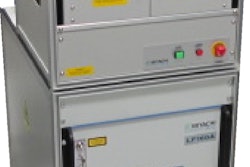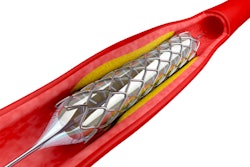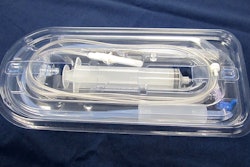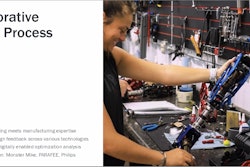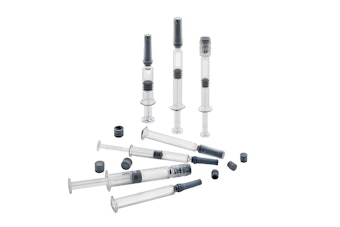Melicor Medical has developed and commercialized LLICS™, Laparoscopic Lens Internal Cleaning System, which features a handle made of polymers from Eastman Chemical Co. The announcement was made at the Medical Design & Manufacturing West (MD&M West) trade show in Anaheim, CA.
LLICS is a patent-pending surgical instrument that cleans laparoscope lenses during minimally invasive surgeries in situ [in the original or natural position]. LLICS has a grip handle made from a proprietary blend of Eastman Ecdel™ elastomers and Eastar™ copolyester. These polymers provide the flexibility and durability to create a living hinge-like grip handle that undergoes repeated squeezing throughout a surgical procedure.
During surgery, the instrument, which measures 5 millimeters in diameter x 30 centimeters in length, fits into trocar cannula and uses an applied surfactant to clean off the lens of the laparoscope. Prior to inserting LLICS into the cannula, a surgeon squeezes the instrument’s handle to retract the sponge. After the instrument is inserted into the body cavity, the surgeon squeezes the handle in the opposite direction to deploy and apply the sponge to the lens.
Eastar, used in medical devices, provides chemical resistance to a host of chemicals typically found in the medical arena including disinfectants and bodily fluids, has impact resistance and retains clarity with very little color shift after sterilization with gamma or electron beam radiation or ethylene oxide. Ecdel elastomers are clear and tough with elastomeric-like properties that impart strength and puncture-resistance while providing heat resistance, heat sealability, and autoclavability.
By using LLICS, a surgeon can engage the sponge to clean the lens as needed, in situ. When cleaning the lens with conventional techniques, it typically is removed from the body cavity and wiped off or placed in hot water to keep warm. As it is placed back into the body cavity, the lens can pick up debris and blood, or become foggy, causing the surgeon’s view through the lens to become obstructed, necessitating repeated removal and cleaning.
“When using LLICS, a surgeon can often save time by quickly cleaning the lens as needed, without removing the laparoscope,” says Ken Maydew, president and CEO, Melicor Medical. “By taking a laparoscope in and out of the body cavity throughout a procedure, a surgeon can lose his or her focus and precious time, which could result in a patient remaining under anesthesia longer than necessary.”
Customers who have purchased LLICS have been pleased with the device and its living-hinge actuator handle. The instrument is available for purchase in the U.S., and Melicor is working to make the product available for purchase in the European Union and other nations. The U.S. Food and Drug Administration granted the device clearance in spring 2012 and it has patents pending. Additionally, licensing opportunities are available from Melicor for its living-hinge actuator handle technology. To learn more and to see LLICS.



